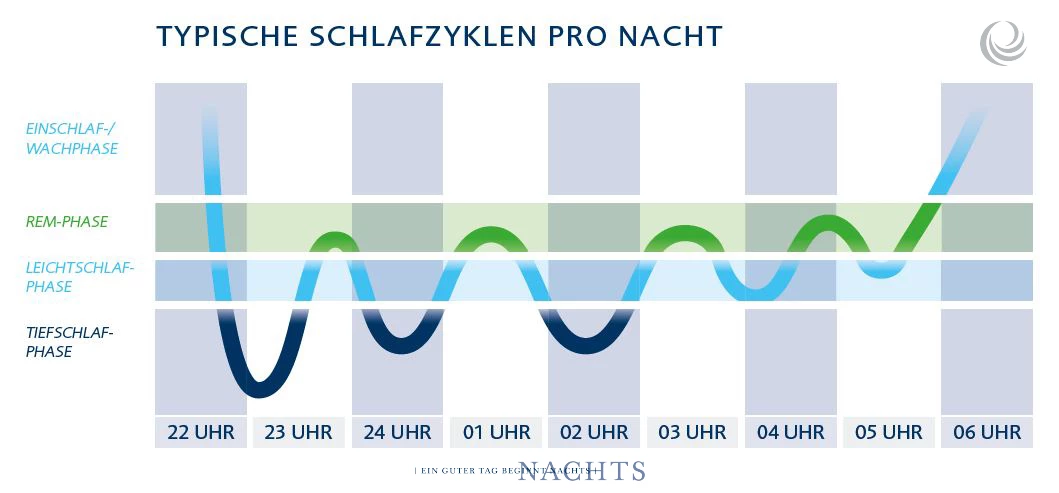When you go to bed at night, a relaxation process begins: your breathing and pulse slow down, your blood pressure and body temperature drop. The muscles relax. Then the eyelids close and the eyeballs remain in one position. The brain relaxes so that it no longer transmits stimuli such as soft noises or gentle touch: You have fallen asleep.
SEVERAL SLEEP PHASES AND CYCLES PER NIGHT
Sleep at night should not be understood as a monotonous state in which the mind and body are completely inactive. Rather, people go through different phases during sleep: Falling asleep phase, light sleep phase, deep sleep and REM (Rapid Eye Movement) sleep – we sleep according to a fixed rhythm. From light dream sleep to motionless deep sleep – we go through all sleep phases several times in a row within one night. Around five such sleep cycles lasting around 90 minutes can occur in a row each night.
DID YOU KNOW …
… that sleep researchers believe that the delta waves of the deep sleep phase are the answer to the question of why we sleep at all? Because the delta waves play a decisive role in tidying up the brain.
Background: During the day, new synapses form between the brain cells as a result of experiences and impressions. Many of these are superfluous and interfere with the really important memories. The delta waves remove them and make room for new ones.
SLEEPING PHASE
The falling asleep phase is a very light sleep and forms the transition between being awake and sleeping. The body slowly comes to rest during this sleep phase. Breathing and pulse rate slow down, the muscles increasingly relax and the body temperature also drops. You tend to shiver. As sensory perception diminishes, mental activity decreases. Concentration decreases and reaction times become longer. Consciousness is only weakly present. Eye movements change: they become slower and move vertically instead of horizontally as in the waking state. Sleep is now still very light. Even minor disturbances can wake us up and we are wide awake again.
LIGHT SLEEP PHASE
It takes between five and around 30 minutes to fall asleep. We cannot remember the actual moment of falling asleep. In a fraction of a second, the brain releases chemical substances that switch off consciousness. During the light sleep phase, the muscles relax. This can lead to muscle twitching. The pupils become narrower. Eye movements come to a standstill. Consciousness is completely switched off. This sleep phase becomes increasingly longer during the night and accounts for more than half of the total sleep time.
DEEP SLEEP PHASE
In the deep sleep phase, the actual physical relaxation and mental recuperation takes place. It is very difficult to wake up. If this happens, we are slow to regain consciousness and usually fall asleep again straight away. During this sleep phase, the body releases large amounts of growth hormones, which it needs for regeneration. The immune system is activated, disposes of metabolic waste and produces more antibodies. This is the time of cell repair. Tired muscles regenerate. Skin, hair and bones grow back.
REM PHASE
From falling asleep to deep sleep, our sleep remains essentially uniform. This changes with the onset of REM sleep. The name comes from the rapid eye movements that characterise this stage of sleep – the ‘Rapid Eye Movement’. Brain activity accelerates considerably during this sleep phase. Information is retrieved from the brain’s long-term memory, but emotional sensory impressions are also processed. Memories are reorganised. This is why we dream in the REM phase in particular. The body remains relaxed.
The muscles are very relaxed and protect the sleeper from physically acting out dreams and hurting themselves. Nevertheless, the pulse and breathing can accelerate.
WE GO THROUGH FOUR SLEEP PHASES EVERY NIGHT
These are repeated in regular sleep cycles. Each of the phases has special features that contribute to our recovery. Most of the time we are in light sleep.
At the beginning of the night, the cycles have more deep sleep phases and fewer REM phases. These increase as the night progresses. As the duration of sleep increases, sleep becomes less deep overall – until we wake up.














